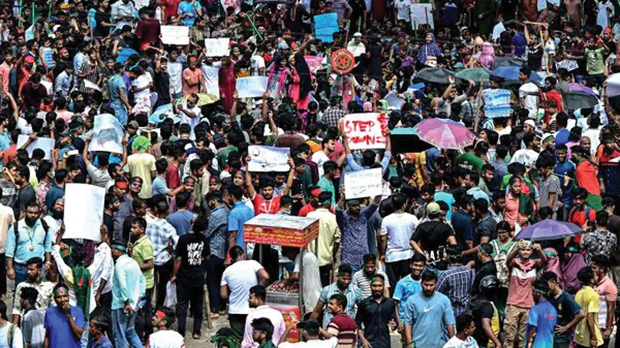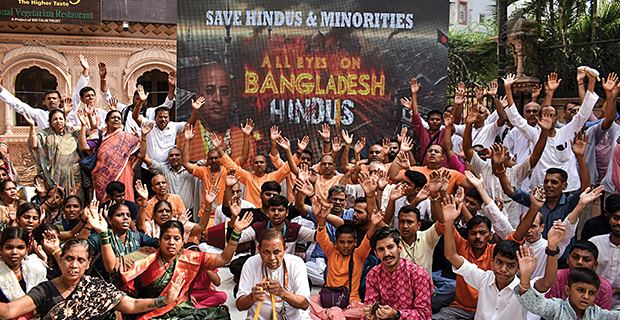Tragically, Hindus Unsafe

The international community must recognize the urgency of this crisis. While it is easy to dismiss these developments as internal matters, their implications are far-reaching. A radicalized Bangladesh threatens not only its minorities but also the stability of South Asia as a whole. The selective activism of Western human rights organizations must give way to a more consistent and principled approach that addresses all forms of religious persecution, regardless of geographic or political considerations.
Bangladesh’s journey toward secularism is at a critical juncture. The country’s leadership must take decisive action to prevent further violence and restore public confidence in the state’s commitment to justice and equality. This requires more than mere rhetoric; it demands structural reforms, robust law enforcement, and a zero-tolerance policy toward extremism. Civil society, too, has a crucial role to play in resisting the encroachment of radical ideologies and promoting the values of pluralism and coexistence.
In spite of facing a severe backlash from Hindus all over the world over the shocking arrest and jailing of Chinmoy Krishna Das Brahmachari, the Bangladesh government headed by Chief Advisor Muhammad Yunus has reportedly ordered the country’s banks to freeze accounts of 17 people with “interests associated” with the International Society for Krishna Consciousness (ISKCON) in Bangladesh.
Local media in Dhaka reported that the Bangladesh Financial Intelligence Unit (BFIU) has ordered the freezing of bank accounts belonging to 17 individuals associated with Iskcon Bangladesh, including its jailed leader Chinmoy Krishna Das Brahmachari, for 30 days. Reports indicated that the government directive to suspend all transactions from the accounts for one month has been sent to several banks and financial institutions in the country.
Besides Das, who was taken into custody by the Detective Branch (DB) of Dhaka Metropolitan Police at Hazrat Shahjalal International Airport on Monday and jailed a day later, the other 16 Hindus targeted by the Bangladeshi government are Kartik Chandra De, Anik Pal, Saroj Roy, Sushanta Das, Biswa Kumar Singha, Chandidas Bala, Jaydev Karmakar, Lipi Rani Karmakar, Sudhama Gaur Das, Laxman Kanti Das, Priyatosh Das, Rupan Das, Rupan Kumar Dhar, Ashish Purohit, Jagadish Chandra Adhikari, and Sajal Das.
“BFIU’s letter said, under the powers conferred by Section 23(1)(c) of the Prevention of Money Laundering Act-2012, orders to suspend for 30 days the transactions of accounts (other than accounts of import and export companies) maintained in the name of ISKCON and its related parties and entities owned by them. given At the same time, BFIU has asked to send the accounting related information of all the accounts, such as account opening form, KYC form, up-to-date transaction statement etc., within the next three working days,” reported Prothom Alo, a leading Bengali newspaper in Bangladesh.
Chinmoy Krishna Das, spokesperson for the Sanatan Jagaran Jote, has been accused of sedition by the Bangladeshi authorities for allegedly disrespecting the country’s flag by hoisting a saffron flag above it in Chittagong. As Bangladeshi Hindus in the country took to the streets, Das was produced in a Chittagong court and sent to jail subsequently. At the same time, violence broke out in the court building, leading to the death of a 32-year-old advocate Saiful Islam Alif. Radicals in Bangladesh are now blaming supporters of Das for the lawyer’s death even though Iskcon and other Hindu organisations have made it clear that no Hindus were involved in the ruckus that took place in the court premises on the given day.
Several leaders of the interim government and others, including Hasnat Abdullah and Sarjis Alam, who led the so-called ‘Anti-Discrimination Student Movement’ that eventually resulted in the fall of government headed by former Prime Minister Sheikh Hasina in August - continue to orchestrate a disinformation campaign against Hindus and the leading spiritual organisation in the country, accusing Iskcon Bangladesh of “inciting unrest” and calling for its immediate ban.
“Iskcon is acting as an agent of the Awami League, attempting to destabilise the country. This extremist organisation is behind the brutal killing of lawyer Saiful Islam,” said Hasnat Abdullah in a vicious hate speech in Chittagong.
The attacks on ISKCON temples and places of other religious minorities and shrines are not isolated incidents; they are a symptom of a deeper malaise that threatens to unravel the social fabric of Bangladesh. If left unchecked, this pogrom could plunge the country into a cycle of violence and instability, mirroring Pakistan’s descent into religious intolerance. The international community, regional actors, and Bangladesh’s own leadership must act decisively to prevent this outcome. The stakes are too high for complacency. Bangladesh’s future as a secular, pluralistic nation—and the stability of South Asia—hangs in the balance.
—Bureau reports











Comments.